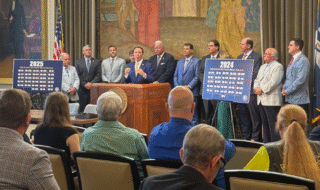April 22, 2024 Last Edit: July 23, 2024
From your small-business-advocacy team in Sacramento
Welcome to the April 22-26 edition of the NFIB California Main Street Minute from your small-business-advocacy team in Sacramento.
Retail Theft Ballot Initiative
- The big political news of last week was the submission on Thursday (April 18) of more than 900,000 signatures to the Secretary of State’s office by the Californians for Safer Communities Coalition to qualify its Homelessness, Drug Addiction, and Theft Reduction Act for the November ballot.
- This was considerably more than the 546,651 signatures needed but part of a well-used strategy by ballot initiative backers everywhere to not only give the appearance of overwhelming support but also have enough to cushion the removal of bad signatures.
- According to the initiative consulting firm, Swing Strategies, “County election officials now have eight working days [as of last Thursday] to determine the total raw count of signatures submitted in their county, prior to triggering a 30-day random sample verification period and certifying valid signatures with the Secretary of State.”
- Unlike prior attempts, this initiative doesn’t seek to broadside Proposition 47. According to the coalition’s news release, “Passed in 2014, Prop. 47 achieved notable success in making California’s criminal justice system more equitable. However, it led to unintended consequences over the past decade — repeat and often organized retail theft, inner-city store closings, and difficulty convincing people to seek drug and mental health treatment — that can only be corrected by the voters at the ballot box with commonsense changes to Prop 47. It is time for meaningful reforms to our justice system, including to Prop 47, that ensure our communities are safe.”
- Will the initiative’s conciliatory approach to Prop. 47 be enough to win over legislative leaders working on their own package of solutions to retail theft? Last week’s Main Street Minute, quoting The Sacramento Bee, gave a clue. Senate President Mike McGuire and Gov. Gavin Newsom “have been clear that they do not want to take retail theft to the ballot or make changes to Proposition 47.” Assembly Speaker Robert Rivas echoed this sentiment. “I believe legislation that would require going to the ballot to address retail crime or theft is not necessary.”
Speaking of Ballot Initiatives
- NFIB has already come out in support of the Taxpayer Protection and Government Accountability Act, which would install a desperately needed tax and regulatory clarity on the state.See news release here.
- We are carefully reviewing all other measures eligible for the November ballot, including:
— Minimum Wage — The Living Wage Act of 2022. Existing law requires annual increases to California’s minimum wage until it has reached $15.00 per hour for all businesses on January 1, 2023. This measure extends these annual increases ($1.00 per year) until minimum wage—currently, $15.00 per hour for businesses with 26 or more employees, and $14.00 per hour for smaller businesses—reaches $18.00 per hour. Thereafter, as existing law requires, the minimum wage will annually adjust for inflation.
— PAGA Repeal — Fair Pay and Employer Accountability Act. Repeals 2004 law allowing employees to file lawsuits on behalf of themselves and other employees against employers to recover monetary penalties for certain state labor-law violations.
— Rent Control — Justice for Renters Act. Current state law (the Costa-Hawkins Rental Housing Act of 1995) generally prevents cities and counties from limiting the initial rental rate that landlords may charge to new tenants … This measure would repeal that state law and would prohibit the state from limiting the right of cities and counties to maintain, enact, or expand residential rent-control ordinances.
- Above descriptions taken from the Secretary of State’s website.
The Legislature
- Look for the next two weeks for bills in the Legislature to go from simmering to boiling over. Here is the latest bill list on the measures NFIB is fighting for or against. Below are a couple of highlights from it that show just how difficult it is to own a business in California.
- SB 399 (Wahab) — would prohibit an employer from requiring an employee to attend an employer-sponsored meeting or participate in any communications with the employer or its agents or representatives. AB 2751 (Haney) would give employees the right to disconnect from communications from the employer during nonworking hours. More information can be read in this letter of opposition to SB 399 and this letter of opposition to AB 2751.
- SB 1116 (Portantino) — would award unemployment benefits to striking workers who already have jobs. A letter of opposition to SB 1116 can be read here.
- So, do we really need to read stories like this? California overpaid as much as $55B in unemployment claims. Will it ever get the money back?
Calendar
- May revise of the governor’s 2024-2025 proposed state budget. Date TBD
- May 24 deadline for bills to pass their house of origin (Assembly, Senate)
- June 15, midnight, constitutional deadline to pass 2024-2025 state budget
- June 27 deadline for ballot measure to qualify for November. Last day for proponents of a qualified ballot initiative to withdraw it.
- August 31 deadline for bills to have passed Legislature and sent to governor
- September 30 deadline for governor to sign bills into law
- November 5, General Election Day
National
Highlights from NFIB Legislative Program Manager Caitlin Lanzara’s weekly report
- On April 15, NFIB President Brad Close issued a statement for Tax Day 2024:
— “On this Tax Day, small business owners want to see Congress take action and make the 20% Small Business Deduction permanent. Unlike their larger competitors, small business owners are at risk of a significant tax hike if the Small Business Deduction expires in 2025. As small businesses represent nearly half of the GDP, passing the Main Street Tax Certainty Act should be a top priority for Congress and the administration. We are encouraged that this important bipartisan legislation has been introduced in both Chambers and urge Congress to pass it.”
- On April 16, the Wall Street Journal published an op-ed from NFIB President Brad Close, titled, “Make the Small-Business Tax Cuts Permanent.”
- On April 18, NFIB-WV member Michael Ervin, who recently testified before Congress on the Small Business Deduction also wrote an op-ed in The Washington Times, titled, “Main Street needs Congress to make small-business deduction permanent.”
This Main Street Minute can also be read on the NFIB California webpage here. Next Main Street Minute April 29.
NFIB is a member-driven organization advocating on behalf of small and independent businesses nationwide.
Related Articles














